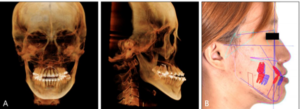The oral cavity acts as a portal to your entire body. It is home to a plethora of microorganisms, bacteria, fungi, and viruses that have evolved and coexisted with humans for many many years and have been living in harmony in what is called a ‘symbiotic relationship’. They make up the oral microbiome, which plays a significant role in our physiology and well-being. When the delicate balance between health and sickness is disrupted, the oral microbial flora can wreak havoc on your oral health and general well-being. Imbalances in the microbial makeup of your mouth are heavily dependent on your oral hygiene and can contribute to systemic health issues and vice versa.
People with good oral health possess a microbiome predominantly occupied by gram-positive bacteria. A healthy ecosystem keeps the pathogen microbes in control and keeps them from causing too much harm. In contrast, an abundance of disease-causing gram-negative bacteria resides in those with poor oral hygiene. Neglecting oral care creates the perfect environment for encouraging the growth and manifestation of these disease-causing microbes, increasing the risk for infections, and provoking a systemic immune response. That is when the oral microbiome is said to be in ‘dysbiosis’.
A dysbiotic oral environment is said to have deleterious effects on general health. Here’s a list of how neglecting oral care can cost you:
Heart Disease
Numerous studies support the notion that poor oral health can lead to cardiovascular events such as stroke or heart attack. The incidence of cardiac problems is considerably higher in people with periodontitis or tooth loss compared to people with good oral health. The bacteria that infect your gums travel through your bloodstream to other areas of your body. Inside the blood vessels, they cause vascular damage and inflammation by releasing endotoxins. Notorious for their reputation as a significant risk factor for atherosclerosis, bacterial endotoxins cause enough damage to the vessel walls that the formation of tiny blood clots and, subsequently, heart attack and stroke become inevitable.
More information, however, is needed to establish a direct link between cardiovascular disease and oral health.
Diabetes
The relationship between diabetes and periodontitis is bidirectional. Diabetes weakens the immune system and thus makes you more prone to infections. With the body’s immunity at its lowest, your gums are vulnerable to taking the hit and becoming inflamed.
Studies show that poorly-controlled diabetes, with an HbA1c >7.5%, can make you three times more vulnerable to developing periodontitis than a non-diabetic. Gingivitis and periodontitis are thus more prevalent and severe in people with diabetes. What’s worse is that people with severe periodontitis have a hard time maintaining glycemic control. The flip side is that poor glycemic control can negatively impact oral health and trigger a vicious cycle of periodontal destruction. As a comforting prospect of this daunting situation, we have some good news for you: If your diabetes is well under control, there is no increased risk of periodontitis that faces you.


Adverse Pregnancy Outcomes
Increased incidences of preeclampsia, low birth weight, spontaneous abortions, and stillbirth are common complications seen as devastating consequences of poor oral health during pregnancy.
Changes in the oral flora of a pregnant patient take place during this time. An increase in the levels of anaerobic and gram-negative bacteria is observed in the oral microenvironment. These anaerobes are translocated to the uterus where they trigger an inflammatory process that results in myometrial contractions, and eventually, preterm labor. The fluctuating levels of estrogen and progesterone during pregnancy trigger capillary dilation within the gums, resulting in gingival inflammation and hypertrophy.
The chances of preterm labor are 7.5 times higher in a woman with periodontal disease. We encourage all women who are planning a pregnancy, especially those with known periodontal disease, to visit their dentist for a periodontal consultation and get the required treatment.
If pregnancy has begun, the second trimester is the safest time to get dental treatment. Only the most important treatment is provided, that if postponed until after pregnancy, would be dangerous for the patient. These procedures include atraumatic tooth extractions, root canal treatments, and fillings. All other elective procedures should be deferred until after the delivery. The research results on whether or not it is advisable to treat periodontal disease during pregnancy are still somewhat inconclusive. Despite that, it is intuitive that good oral care benefits both the mother and the fetus and is an important component of a healthy pregnancy. Focus on educating pregnant women about the importance of oral health for themselves and their unborn children. Conduct regular oral exams during the initial stages of pregnancy to prevent any adverse outcomes.
Cognitive decline
In addition to the vast list of detrimental ways tooth loss can affect you, there’s also the risk of cognitive decline and dementia. According to a research study, the risk of cognitive impairment increases as you lose more teeth. More precisely, the chances are 1.4 times higher for adults with more tooth loss to undergo mental deterioration and 1.28 times higher for developing dementia. On the bright side, the study revealed that older adults who wore dentures weren’t affected as much, suggesting that receiving prompt dental treatment helps maintain good mental health.


Collaborative Care
Effective collaborative care between dentists and physicians is prudent to ensure better patient outcomes and increased satisfaction on part of the patient, the dentist, and the healthcare provider. Making proper medical referrals and discussing the patient’s medical needs with their healthcare providers dramatically improves their systemic and dental health, and boosts overall well-being. It also has a major impact on enhancing the patient’s immune system, enabling them to fight oral and systemic infections better.
A Word to the Wise
Regardless of whether there is a direct or indirect link between the unfortunate consequences of poor oral health mentioned above, a healthy oral environment and a regimen to maintain it is essential to help you safeguard your teeth. As they say, prevention is better than cure. Most people with chronic diseases are not aware of how their oral health can be contributing to their medical conditions. The interprofessional patient care approach is the way to go to ensure the optimization of your patient’s health and general well-being.
References:
https://www.nyu.edu/about/news-publications/news/2021/july/tooth-loss-cognitive-impairment.html
https://www.agd.org/docs/default-source/self-instruction-(gendent)/gendent_nd17_aafp_kane.pdf



